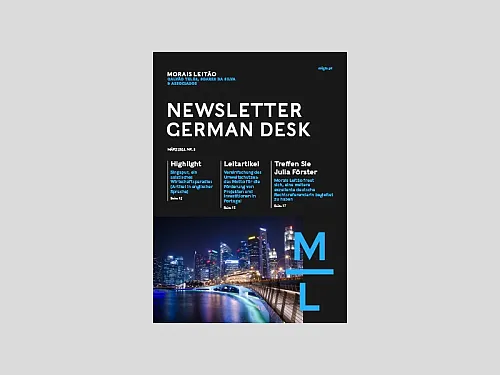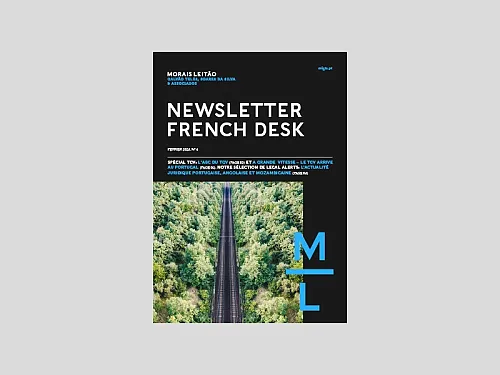29.05.2018
Case C-637/17 - Preliminary ruling on the private enforcement directive (Directive 2014/104/EU)

Introduction
Directive 2014/104/EU, aiming at facilitating the right to seek compensation for damages deriving from violations of competition law, entered into force on 5 December 2014. Although the transposition period has expired on 27 December 2016, parliamentary draft legislation No. 599/XIII and legislative proposal No. 101/XIII, which aimed at implementing the Directive, were only approved by the Parliament on 20 April 2018. This late implementation raises important questions in terms of EU law.
On 27 May 2015, Cogeco Cable brought an action against Sport TV and its shareholders (NOS and Controlinveste), seeking compensation as a result of a violation of competition law committed by Sport TV. Such violation was declared by the Portuguese Competition Authority (Autoridade da Concorrência) on 14 June 2013 and upheld on appeal both by the Portuguese Competition Court (Tribunal da Concorrência, Regulação e Supervisão) and by the Lisbon Court of Appeals (Tribunal da Relação de Lisboa).
Within this lawsuit several questions on EU law were raised, especially concerning the compatibility between national and EU law provisions on the effects granted to final national decisions finding an infringement of competition law for the purposes of a private enforcement action (Article 623(1) of the Portuguese Civil Procedure Code and Article 9(1) of Directive 2014/104/EU); and the limitation period applicable to such action (article 498 (1) of the Portuguese Civil Code and Articles 10(2), (3) and (4) of the Direc¬tive). Indeed, applying the limitation period prescribed under Article 498(1) of the Portuguese Civil Code might mean that the applicant’s claim is already time-barred. It was within this framework that the Lisbon Court of First Instance (“Tribunal Judicial da Comarca de Lisboa”) decided to stay the proceedings and refer to the Court of Justice (“ECJ”) for a preliminary ruling.
Case C-637/17
As this is the first time the Court is being called upon to give a ruling on Directive 2014/104/EU, this can be a landmark judgment. Likewise, the questions posed are crucial for the national court to rule on the admissibility and the merits of the case.
The national court referred six questions to the ECJ, mainly related to the possibility of invoking Articles 9(1) and 10(2), (3) and (4) of the Directive before the former, although the transposition period had not expired yet by the time the lawsuit was brought and even if what is at stake is a dispute between individuals, therefore touching upon the horizontal direct effect of directives. Other cornerstone principles of EU law shall also be pondered, such as the obligation of interpreting national law in conformity with EU law and the principle of procedural autonomy of the Member States, albeit in full respect of the principles of equivalence and effectiveness.
Regarding the first question, the ECJ was asked about the possibility for the applicant to invoke the relevant provisions of the Directive before the national court, albeit within the framework of a dispute between individuals. The fourth question, whose relevance is dependent on a positive answer being given to the first question, entails an assertion of whether the nation¬al provisions at stake shall be interpreted in conformity with Articles 9(1) and 10(2), (3) and (4) of the Directive, even if, once again, the lawsuit was brought while the transposition period was still pending. This question will likewise lead to a broader analysis of the obligations arising for the Member States and national courts after a directive’s entry into force and before the transposition period comes to an end.
With the second and third questions, the referring court asks in essence whether the principles of equivalence and effectiveness, acting as limits to the Member States’ procedural autonomy, might compromise the compatibility of the relevant national provisions with the general principles and rules of European Union law.
Finally, the last two questions (fifth and sixth) consist of the referring court’s (welcomed) attempt to make sure that any eventual affirmative answer to any of the previous questions would not lead to a violation of the prohibition of retroactivity, prescribed inter alia under Article 22(1) of the Directive. Hence, the national court asks whether interpreting the national provisions in conformity with the Directive’s relevant norms is in itself contrary to Article 22(1). If the ECJ considers that enacting such an interpretation is liable to contravene the prohibition of retroactivity, the referring court aims at clarifying whether the defendants in the main proceedings can invoke Article 22(1) and therefore temporarily limit the undesirable effects deriving from the interpretation of national law in conformity with other norms of the Directive.
In procedural terms, the parties in the main proceedings have already been given the opportunity to submit written observations, which are now in the process of being translated. The Court will then decide on the necessity of holding a hearing, as well as on the need for conclusions of the Advocate General (Article 59(2) of the Consolidated Version of the Rules of Procedure of the Court of Justice of 25 December 2012).
This article was written by lawyers Gonçalo Machado Borges and Mariana Martins Pereira.


